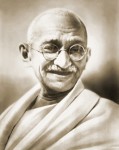Overcoming Differences
June 25 marked 25 years since the United Nations (UN) adopted the Vienna Declaration and Programme of Action (1993). Among its 100 topics, it states that, “The World Conference on Human Rights considers human rights education, training, and public information essential for the promotion and achievement of stable and harmonious relations among communities and for fostering mutual understanding, tolerance, and peace.”

We know that a lot still needs to be done before we see all the objectives of this memorable document fully complied with. Hence my effort to always present our modest collaboration as well.

Gandhi
As a matter of fact, with regard to the general understanding of people and nations, as I wrote in my book Reflexões e Pensamentos — Dialética da Boa Vontade (1987) [Reflections and Thoughts – The Dialectic of Good Will] and previously in the Jornal da LBV (January 1984) [The LGW Journal]: When we talk about the union of all for the good of all, some people may get scared, thinking about the capitulation of their points of view to the dull flatness of a depersonalized alliance, the deplorable human automatism. This is not the case at all. In Democracy everyone has the duty (far more than the right) of honestly (a basic requirement) and with a spirit of tolerance to express their ideals, their way of seeing things. However, no one has the right to hate on the pretext of thinking differently, nor of living intimidated for the same reason. Gandhi (1869-1948) used to say that, “differences of opinion should never mean hostility,” and it was undoubtedly because he believed this that the Mahatma became the main character in the independence of his people.

The Indian wise man also made this notable statement as to the need to foster a Culture of Peace in hearts in order to overcome animosity between different people: “Keep your thoughts positive because your thoughts become your words. Keep your words positive because your words become your behavior. Keep your behavior positive because your behavior becomes your habits. Keep your habits positive because your habits become your values. Keep your values positive because your values become your destiny.”
Despite the differences
Destiny brings to mind the shining faces of the children whom we think about when we strive to provide them with a culture of Peace through basic education allied with affection. I present you with the result of this effort when it is well done, in the words at the time of a Little Soldier of God (the affectionate way we refer to children in the LGW), who had been growing under the wings of the Pedagogy of Affection, the vanguard flag of our legionnaire toil. Letícia Tonin was 7 years old when she said, “Love is bigger than everything, even if people are different.”
The comments do not represent the views of this site and are the sole responsibility of their authors. It denied the inclusion of inappropriate materials that violate the moral, good customs, and/or the rights of others. Learn more at Frequently asked questions.